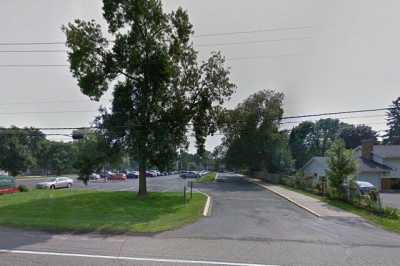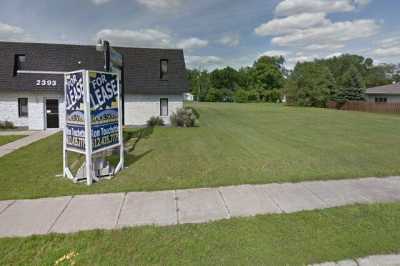
10 Best Nursing Homes in Minneapolis, MN
Minneapolis is a popular retirement location due to its livability, vibrant cultural scene, and abundant natural beauty. Seniors who need care have various welcoming choices in the Twin Cities.
Selecting a nursing home can feel overwhelming, primarily due to the many definitions associated with the term. While it is often used broadly to encompass senior living, its true definition refers to specialized establishments offering round-the-clock supervision and licensed health care services for seniors, known as skilled nursing facilities. Oftentimes, people are looking for alternative living arrangements, such as assisted living or memory care. Assisted living facilities cater to seniors who are somewhat active but need assistance with some activities of daily living, while memory care facilities serve seniors with memory loss and other related conditions.
A Place for Mom doesn’t partner with standalone nursing homes, but we do partner with 66 assisted living and memory care facilities within a 10-mile radius of downtown Minneapolis. Our guide will explain what you and your family may anticipate from these senior care communities, how to pay for them, and what rules govern them in Minneapolis. We’ll also discuss what Minneapolis as a city has to offer.
Nursing Homes Facilities near Minneapolis, MN
"I feel like I'm on vacation!" That is what my mother said multiple times while staying at Langton Shores TCU. The nurses and aides were so kind and attentive. The food was very good and she loved the...
Rivers of Life Memory Care and Enhanced Assisted Living of Eagan
2811 Pilot Knob Road, Eagan, MN 55121Professional and compassionate staff. I would recommend Rivers of Life to others.
My dad just loves Meadowood Shores! Meadowood is the independent living side of the campus. He didn't want to move from his house but he realized he needed a change, just too lonesome after mom passed a...
My wife and I recently made the transition into this community and I could not be more pleased with our experience so far. My favorite thing about this establishment would have to be the staff. They are...
My grandfather lives at meadow ridge and I can finally say he has found himself a great home. We had switched from 2 other assisted livings because they were not to his liking. He is very particular...
My mother is currently at Walker Methodist Care Suites. She has not been here long, but she is very happy here. She loves the size of her apartment, she enjoys the food, goes to activities, and chats with...
These ratings are based on the experience prior to COVID. I cautiously recommend this community, I would say to keep checking on your loved one. There have been times family members have visited my...
My husband and I have lived in Roseville all our 55 years of marriage and in selecting a new home we wanted to stay in the area. Before deciding on EagleCrest we visited ten independent living facilities in...
Our free advisors can help
- Compare local facilities
- Determine care type
- Schedule tours
- Evaluate pricing
My dad is doing really well at this place. He is in the memory care and they are attentive and understand him, doing a fine job with the care. The food is fine and dad thinks it has gotten better. My dad...
I feel I had a better experience with Assisted Living than the Long Term Community. My loved one transitioned from Assisted Living to the other stages of the community. We ended up making the decision to...
My loved one was previously a resident at Johanna Shores and everything about the experience was great. I think that this facility has better overall services and values, compared to some of the other...
The Landmark of Fridley is the night staff was not very good and we had a lot of bumps in the road at first. Most of them were because of mom though. Things have evened out now. It's been a long road but all...
Our methodology
How we rank order the Minneapolis community options above
We developed a proprietary recommendation system that orders Minneapolis community options based on factors we know are important to seniors and their families:
- Proximity to your search location
- Availability of recent, high-quality reviews
- The amount of detailed community information available
Where we source our information
14,000+ communities
We collect proprietary data from our network of 14,000+ senior living communities in the U.S., with regular refreshes of data and information
350,000+ reviews
We have 387,000+ reviews from senior living residents and family members that provide first-hand accounts about senior living communities
- Costs of nursing homes in the Minneapolis area
- What families are saying about nursing homes in Minneapolis
- How people pay for a nursing home in Minneapolis
- Understand Minnesota laws and regulations for nursing homes
- What to expect from nursing homes in Minneapolis
- Minneapolis nursing homes services and amenities
- Explore senior care with confidence
- Unfamiliar with Minneapolis? Highlights for seniors
Costs of nursing homes in the Minneapolis area
The median monthly cost of a private room in a Minneapolis nursing home is $13,005, and $11,708 for a semi-private room.[01]
Assisted living is much less expensive. The average monthly prices for assisted living and memory care among seniors referred to facilities in A Place for Mom’s network are $4,546 and $4,631, respectively, according to A Place for Mom’s data.[02] The cost figures reflect what residents actually paid at our network facilities, taking into account various floor plans, amenities, and other variables. Costs include access to in-house care (e.g., ambulatory, diabetic, and incontinence care); medication management (available at 83% of facilities); meals, and wheelchair-accessible bedrooms, bathtubs, and showers.
Average monthly cost of Nursing Homes in Minneapolis, MN vs. nearby cities
Average monthly cost of Nursing Homes in Minneapolis, MN vs. the state and national average
Average monthly cost of Nursing Homes in Minneapolis vs. other types of senior living
Median monthly costs of Nursing Homes in Minneapolis, MN by room type
Average cost of Nursing Homes in Minneapolis over time
What families are saying about nursing homes in Minneapolis
Recent reviews for nursing homes in Minneapolis
The Glenn Hopkins
Parkshore Senior Campus in Saint Louis Park, MN
Meadow Woods - Martin Luther Campus in Bloomington, MN
How people pay for a nursing home in Minneapolis
Securing skilled care from a nursing home, assisted living community, or memory care facility requires significant resources from seniors and their loved ones. In this section, learn more about common payment choices for senior care, such as through private payment methods, VA benefits, Medicare, and/or Medicaid.
Skilled nursing, assisted living, and memory care stays can be financed using any combination of private and public sources. Private pay funds may be derived from personal bank accounts, stock portfolios, 401(k)s, or individual retirement accounts. To learn more about leveraging commonly used private sources of payment, see the articles below.
Number of veterans who live in Minneapolis
About 18% of Minneapolis veterans are 75+
Several veteran benefits can help minimize the cost of time in assisted living and memory care facilities in Minneapolis, as VA benefits can be used toward some care services in senior living facilities.
The VA Aid and Attendance benefit can be used to pay for a skilled nursing home, assisted living complex, or memory care facility. For qualified veterans, this benefit will be given as additional compensation on top of the VA Pension.
Veterans can seek help from veterans services officers, primarily found through veterans services organizations (VSOs), to enroll and register for the Aid and Attendance benefit, VA Pension, or any other VA benefit they might be eligible for.
The application processes are often confusing and time-consuming, so it’s recommended that seniors and their caregivers enlist assistance so that seniors can get all the aid they’re entitled to. To that end, consider contacting any of the agencies listed below for benefits advice.
Resources for Minneapolis veterans
VA Regional Benefit Satellite Office at Minneapolis VA Medical Center
1 Veterans Drive
Minneapolis, MN 55417
Phone: 800-827-1000
Hours: Temporarily closed
St. Paul Regional Benefits Office
1 Federal Drive
St. Paul, MN 55111
Phone: 800-827-1000
Hours: Monday through Friday, 8 a.m. – 4:30 p.m.
Hennepin County Veterans Service Officers
300 S. Sixth St.
Minneapolis, MN 55487
Phone: 612-348-3300
Hours: Monday through Friday, 8 a.m. – 4:30 p.m.
Minnesota Veterans of Foreign Wars
Phone: 651-291-1757
Fax: 651-291-2753
Disabled American Veterans Department of Minnesota
State Veterans Service Building, Floor 3
20 W. 12th St.
St. Paul, MN 55155
Phone: 651-291-1212; 888-317-2291
Hours: Monday through Friday, 7:30 a.m. – 3:30 p.m.
American Legion Minneapolis/Richfield Post 435
6501 Portland Ave.
Richfield, MN 55423
Phone: 612-866-3647
American Legion Minneapolis Post 99
5600 S. 34th Ave.
Minneapolis, MN 55417
Phone: 612-724-9909
Hours: Tuesdays, Wednesdays, Thursdays, 4 – 8 p.m.; Fridays, 4 – 9 p.m.
Giantvalley American Legion
3751 Minnehaha Ave.
Minneapolis, MN 55406
Phone: 612-729-6824
Hours: Monday through Sunday, 9 a.m. – 4 p.m.
American Legion Department of Minnesota
20 W. 12th St., Room 300-A
St. Paul, MN 55155
Phone: 651-291-1800; 866-259-9163
Fax: 651-291-1057
Minnesota’s Medicaid program, Medical Assistance (MA), can help with expenses related to the care given in senior living facilities. For example, Medicaid waivers such as Minnesota’s Home & Community-Based Services program cover in-home medical care services for seniors who need help with daily living tasks. However, Medicaid does not cover the cost of living in an assisted living or memory care facility. Check out the full list of the services MA covers and learn more about MA eligibility requirements in the provided links.
Regrettably, Medicaid only provides coverage for room and board expenses at nursing homes. Seniors residing in assisted living or memory care facilities are unable to utilize Medicaid to offset custodial expenses. However, Medicaid does cover medically essential services.
Minnesota’s Department of Human Services website outlines information on how seniors 65 and older should apply for MA. In short, seniors can apply for coverage by mailing in a paper application, or they can take the application to their local county or tribal health care office Alternately, seniors can call 651-431-2670 or 800-657-3739 and request having an MA application mailed directly to them.
Some seniors may additionally be eligible for Minnesota’s Elderly Waiver program, which offers financial support for services (personal care assistance and skilled nursing care) that enable seniors to stay in their own homes, which includes assisted living and memory care facilities. Seniors must qualify for Medical Assistance in order to qualify for the Elderly Waiver.
Seniors who don’t have Medical Assistance or MinnesotaCare (a program for low-income Minnesotans who don’t have access to affordable health care coverage) can still apply for health insurance through MNSure, Minnesota’s health insurance marketplace. For Medicaid advice and alternatives, contact local resources like health care ombudsman programs or the Area Agency on Aging, which in Minneapolis is known as Trellis.
Minneapolis resident Medicaid resources
Minnesota Medicaid Ombudsman
Phone: 651-431-2660; 800-657-3729
Email: dhsombudsman.smhcp@state.mn.us
Trellis: Area Agency on Aging
1265 Grey Fox Road, Suite 2
Arden Hills, MN 55112
Phone: 651-641-8612
Hennepin County Health Care Assistance
Phone: 612-596-1300; 844-803-8466
Hours: Monday through Friday, 8 a.m. – 4:30 p.m.
Minnesota Health Care Programs Provider Resource Center
Phone: 651-431-2700; 800-366-5411
Medicare is a government-run health insurance program for adults aged 65 and up that doesn’t cover custodial care but does cover care in some skilled nursing facilities. What are custodial costs for seniors in memory care or assisted living? Think of non-skilled personal care, such as help with the activities of daily living like eating, bathing, dressing, moving around, and using the bathroom, plus room and board.
Medicare may, though, cover medically essential in-home care medical needs, and Medicare Part A (hospital insurance) may fund skilled nursing facility (SNF) treatment when it’s medically necessary for the senior to have such care (e.g., they need sterile dressings changed). For more information on Medicare coverage, visit the official Medicare website or call 1-800-MEDICARE (633-4227).
Minnesota seniors also have access to several Medicare Savings Program choices to assist those who qualify with medical costs. Medicare Savings Plans (MSPs) and the Medicare Part D Low Income Subsidy (LIS) can also assist seniors with Medicare Part A and B expenditures (such as monthly premiums, deductibles, copays, and coinsurance). The Senior LinkAge Line is Minnesota’s federally designated State Health Insurance Program (SHIP) that provides unbiased Medicare counseling. Call Senior LinkAge at 800-333-2433 between 8 a.m. and 4:30 p.m. on weekdays for advice or help applying for Medicare. Or visit the Social Security Administration office to apply for these services.
As noted, seniors in Minnesota can receive free health insurance advice and assistance through the State Health Insurance Assistance Program (SHIP), which can help with insurance policy comparison and choosing the best plan. Other state and local programs may also be available depending on income and other variables. Although Minnesota doesn’t have an official pharmaceutical assistance program, the Minnesota Board on Aging helps people save money on prescription drugs through the Senior LinkAge Line, which can direct seniors to manufacturer-sponsored patient assistance programs and assist them in filling out applications for assistance.
For further information, seniors can call the Senior LinkAge Line, get help from their local long-term care ombudsman’s office, or visit the Social Security Administration office.
Minneapolis resident Medicare resources
Social Security Administration Office
1811 Chicago Ave., Suite 1
Minneapolis, MN 55404
Phone: 855-257-0982
Fax: 833-902-2688
Office of Ombudsman for Long-Term Care
540 Cedar St.
St. Paul, MN 55101
Phone: 800-657-3591
Senior LinkAge
540 Cedar St.
St. Paul, MN 55164
Phone: 800-333-2433
Hours: Monday through Friday, 8 a.m. – 4:30 p.m.
State Health Insurance Help Program (SHIP)
Phone: 800-333-2433
Email: info@shiphelp.org
Understand Minnesota laws and regulations for nursing homes
The Minnesota Department of Health (MDH) licenses and regulates senior living facilities through its Office of Health Facility Complaints. To get a license to operate a nursing home in Minnesota, the facility must follow state and federal regulations, such as minimum staffing standards, medication administration, infection control, and resident rights. The institution must also pass a stringent inspection process, including an MDH survey, to verify compliance with state and federal requirements.
The Minnesota Administrative Rules: Chapter 4658 regulates nursing homes in Minnesota, covering licensure and operation requirements, staffing, resident care, facility safety, resident rights (privacy, dignity, and access to medical care), and prevention of abuse, neglect, and financial exploitation. The law ensures high-quality care for nursing home residents and provides that they should be treated with decency and respect. Minnesota outlines specific staffing regulations for nursing home facilities, including requiring a registered nurse to always be on duty. The state also mandates minimum staffing ratios for nursing homes based on the number of residents. For full details on Minnesota’s laws regarding nursing homes, refer to the 2022 Minnesota Statutes: Chapter 144A.
Federally, the Centers for Medicare & Medicaid Services oversees nursing home care. CMS establishes minimum standards for all nursing homes to meet in order to participate in Medicare and Medicaid programs. Minnesota nursing homes must also follow state laws and undergo regular inspections by the MDH to ensure compliance with both state and federal regulations. These inspections cover resident care, medication administration, personnel, infection control, and facility cleaning. Inspection reports and licenses are available on the MDH website.
Assisted living and memory care facilities
Chapter 144G of Minnesota’s legislation, “Assisted Living Services and Home Care Licensing,” outlines the rules for registering and operating assisted living facilities in the state, including the obligations of residents and providers. The Minnesota Rules governing assisted living licensure, found in Chapter 4659, detail the licensing criteria for these facilities, including specifications for the physical plant, resident care, staffing, and food service.
Assisted living facilities in Minnesota are subject to a number of regulations, such as the requirement that a licensed assisted living director is in charge at all times and that at least one clinical nurse supervisor be employed by the facility, which may be the same person as the director. While there are no mandated staff-to-resident ratios, facilities must ensure that they have enough staff members to meet the needs of all residents and must review staffing plans at least twice per year. Additionally, assisted living facilities must comply with all safety and fire codes, provide three nutritious meals daily plus snacks, and make food menus available to residents a week in advance.
In Minnesota, memory care facilities must adhere to certain standards in addition to the regulations for assisted living facilities, which cover areas such as staff training, staffing levels, and resident care and safety procedures. Specifically, Section 144G.83 of the state’s assisted living statutes requires that personnel at memory care facilities receive additional training.
Furthermore, Minnesota’s assisted living and memory care facilities must comply with the Bill of Rights for Assisted Living Residents.
A minimum of one inspection every two years will be conducted without prior notice to ensure compliance with all regulations and laws. Assisted living facilities’ inspection reports and licenses are available for public viewing at Minnesota’s Health Department’s website.
Minnesota Department of Health contact information
Minnesota Department of Health
625 Robert St. N
St Paul, MN 55164
Phone: 651-201-5000
Hours: Monday through Friday, 8 a.m. – 4:30 p.m.
COVID-19 regulations for Minneapolis nursing homes
In Minneapolis, there are no COVID restrictions in place specifically for nursing homes. However, the local Health Department outlines best practices that assisted living and memory care facilities and other long-term care facilities can implement to help prevent the spread of COVID-19. Some senior living homes may have additional policies in place, so inquire with prospective communities. In general, the COVID-19 best practices in Minneapolis are aligned to these Centers for Disease Control and Prevention guidelines:

Vaccinations.
Employees and visitors are encouraged to have current COVID-19 immunizations and updated booster doses.

Masking.
Masks are not required at health care facilities in Minneapolis, though they may be required at specific locations. People with symptoms, a positive COVID test, or recent exposure to someone with COVID-19 should wear a high-quality mask or respirator.

Facility cleanliness.
Facilities should keep surfaces sanitized and ensure their ventilation systems offer good airflow to prevent the spread of respiratory viruses.

Staff safety.
Staff must wash hands frequently for at least 20 seconds with soap and water, especially after being in a public area or blowing their nose, coughing, or sneezing. Alternatively, they can use a hand sanitizer with at least 60% alcohol.
What to expect from nursing homes in Minneapolis
Moving into a senior care facility can be challenging for seniors and their loved ones. Luckily, there are numerous senior living facility choices available in the Twin Cities, including 66 A Place for Mom partner assisted living and memory care communities.
Seniors and their families looking for nursing home care are typically looking for assisted living, memory care, or some combination of the two. These facilities don’t offer skilled nursing exclusively, but constant medical care is not always what someone needs.
Multiple types of senior and long-term care options available
Minneapolis offers a highly desirable variety of care options for seniors. Within a 10-mile radius of downtown Minneapolis, A Place for Mom’s network includes 66 senior living facilities
A variety of care options
Of these, six are assisted living facilities; two are standalone memory care facilities; six are combination assisted living and independent living facilities; and 20 are combined assisted living and memory care facilities. Additionally, 21 facilities offer a combination of assisted living, independent living, and memory care. Another is a combined assisted living, adult day care, and memory care facility. There are also seven group homes and three combination group homes and memory care facilities. Many care seekers favor locations that combine assisted living and memory care so that their senior loved ones can stay in place even if their care needs change.
Convenient living for Twin City seniors
Senior living facilities in Minneapolis combine the best of both worlds when it comes to urban and natural environments. Though they tend to have easy access to all the amenities of city living, they mirror Minnesota’s gorgeous, lake-dotted landscape by providing pockets of solace within a busy environment. Situated in a northern latitude and benefiting from lake effect weather from Lake Superior, seniors who retire in Minneapolis can enjoy mild summers that allow for outdoor activities, even midday. None of the facilities are too far from parks and nature centers or shopping malls; no matter a senior’s lifestyle, they can find communities that meet their needs.
Various enrichment activities and amenities
Senior living facilities in Minneapolis offer social and mental enrichment, with indoor and outdoor common areas for socializing and visiting loved ones and activities planned for their senior residents. Of the 66 senior living facilities in A Place for Mom’s network, 74% have activity directors who orchestrate activities and excursions for their residents, and 65% of facilities feature planned day trips and outings. Many communities offer stretching classes (60%) and yoga or chair yoga (54%); trivia games (59%) and happy hours (66%); and birthday and holiday parties (74%). These activities serve to maintain residents’ minds, bodies, and spirits.
Even more options a little farther out
The Minneapolis area offers even more possibilities within a 25-mile radius of downtown. Including more of the suburban landscape in the search, you’ll find nine more independent assisted living facilities; 12 additional standalone memory care facilities; 10 group homes; four assisted living and independent living combination communities; 27 assisted living and memory care facilities; 27 combination assisted living, independent living, and memory care facilities, and three combination group homes and memory care facilities.
Minneapolis nursing homes services and amenities
Availability of select care services in Minneapolis nursing homes
Availability of select dementia care services in Minneapolis nursing homes
Availability of select dietary accommodations in Minneapolis nursing homes
Availability of select dining options in Minneapolis nursing homes
Availability of select programs and activities in Minneapolis nursing homes
Explore senior care with confidence
Know where to start.
Identify the right care for your loved one with our free assessment.

See what you can afford.
Understand cost and payment for long-term care based on your loved one's needs.

Find top facilities for you.
Free, personalized guidance from our Senior Living Advisors can help you narrow your search.

Tour your favorite facilities.
Our free touring checklist can help you choose the right community.
Unfamiliar with Minneapolis? Highlights for seniors
Number of seniors over the age of 65 currently living in Minneapolis
Median annual income for Minneapolis seniors 65 and older
Health care for seniors in Minneapolis
Minneapolis is home to several well-known hospitals and a nationally recognized hospital for seniors. There is also a VA clinic nearby for veterans. Learn more about the best hospitals in Minneapolis by exploring the resources listed below.

In Minneapolis, Abbott Northwestern Hospital is a general medical and surgical facility that’s nationally ranked in one adult specialty, according to the U.S. News & World Report.

Park Nicollet Methodist Hospital
Park Nicollet Methodist Hospital in Saint Louis Park is a general medical and surgical center that ranks highly in 14 adult treatments and conditions, according to the U.S. News & World Report.

M Health Fairview University of Minnesota Medical Center
M Health Fairview University of Minnesota Medical Center is nationally ranked in one adult and one pediatric specialty, according to U.S. News & World Report.

The Veterans Administration’s main campus offers primary care, surgery, psychiatry, neurology, cancer therapy, dentistry, and more.
Transportation for seniors in Minneapolis
While services vary from facility to facility, almost all our partner Minneapolis assisted living and memory care residences provide some degree of transportation to its residents. About 65% of Place for Mom’s partner communities offer complimentary transportation services, and 51% offer at-cost options.
At many locations, the staff members arrange transport services for medical appointments, social outings, and other events, provide wheelchair-accessible vans and medical transport vehicles, and can accommodate specific transportation requests.
Seniors 65 and older can save money on bus and train tickets using Metro Transit’s reduced rate for seniors program. This offers 14 popular routes that have frequent service but no schedule. Furthermore, the Northeast Senior Rides program coordinates volunteer drivers to transport seniors aged 60 and up to appointments around Northeast Minneapolis.
Senior activities in Minneapolis
Minneapolis is a vibrant city with beautiful lakes, impressive architecture, and a thriving arts scene. Visitors can enjoy outdoor activities such as strolling around natural lakes like the Lake of the Isles and Lake Harriet. The Como Park Zoo and Conservatory is a great place to watch and interact with animals, with on-site and street parking and public transportation nearby. For seniors with dementia, the Minnesota Landscape Arboretum provides a peaceful environment and guided tours.
Art-loving seniors can also visit the Minneapolis Institute of Art and the Walker Art Center in Minneapolis. The former has a diverse art collection, and the latter offers immersive experiences ranging from modern art installations to community-building initiatives, contemporary dance, and experimental theater. The Mill City Museum is open from 10 a.m. to 4 or 5 p.m. on Thursdays through Sundays and offers a great opportunity to learn about the city’s history, and admission for veterans and those over 65 is a reduced fee of $10.
The Twin Cities are havens for music lovers. The Minnesota Orchestra, known for exceptional classical music performances, can evoke memories and emotions in seniors and dementia patients through the power of its music and acoustics. Orchestra Hall is accessible for disabled visitors, with dedicated parking, ramps, and elevators on the east and west sides of the foyer. Additionally, consider seeking music therapy sessions for the seniors in your life, as this form of therapy can effectively engage seniors with dementia, aiding in memory recall and creating a peaceful environment.
For more modern music lovers, try First Avenue, a historic venue hosting contemporary concerts that is accessible to seniors with disabilities. For even more popular shows, residents can enjoy concerts or an NFL game at U.S. Bank Stadium. The stadium is also wheelchair-accessible; remember to request ADA accommodations before purchasing tickets.
Minneapolis also offers specialized services for seniors with dementia, including memory cafes and support groups at senior centers. Find a comprehensive list of senior-specific resources on the Minnesota Association for Senior Services website.
Frequently Asked Questions
The Waters of Oakdale, Talamore Woodbury and Gable Pines are the top-rated Nursing Homes facilities near Minneapolis, MN. These Nursing Homes facilities received the highest rankings based on verified family reviews. See full list of communities.
The average cost of Nursing Homes in Minneapolis is $4,210 per month. This cost may vary based on location, amenities, floorplan, level of care and other factors.
References
A Place for Mom. (2023). A Place for Mom proprietary data.
Genworth Financial. (2021). Cost of Care Survey.
U.S. News & World Report: News, Rankings and Analysis on Politics, Education, Healthcare and More. (n.d.). Abbott Northwestern Hospital in Minneapolis, MN – Rankings, Ratings & Photos
U.S. News & World Report: News, Rankings and Analysis on Politics, Education, Healthcare and More. (n.d.). Park Nicollet Methodist Hospital in Saint Louis Park, MN – Rankings, Ratings & Photos
U.S. News & World Report: News, Rankings and Analysis on Politics, Education, Healthcare and More. (n.d.). M Health Fairview University of Minnesota Medical Center in Minneapolis, MN – Rankings, Ratings & Photos | US News Best Hospitals Rankings
VA Minneapolis health care | Veterans Affairs. (n.d.-b). Veterans Affairs. VA Minneapolis Health Care | Veterans Affairs

More questions?
Ask an A Place for Mom local advisor at no cost.
- Lauderdale, Minnesota
- Falcon Heights, Minnesota
- Calhoun Beach, Minnesota
- Roseville, Minnesota
- New Brighton, Minnesota
- Hilltop, Minnesota
- Columbia Heights, Minnesota
- Golden Valley, Minnesota
- Robbinsdale, Minnesota
- St. Paul, Minnesota
- Brooklyn Center, Minnesota
- Lilydale, Minnesota
- St. Louis Park, Minnesota
- Arden Hills, Minnesota
- Little Canada, Minnesota
- Richfield, Minnesota
- Fridley, Minnesota
- Mendota, Minnesota
- New Hope, Minnesota
- Edina, Minnesota
















